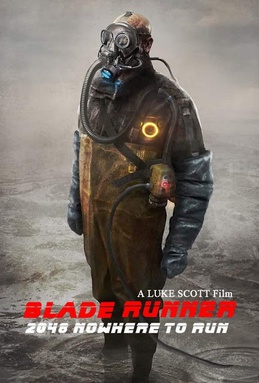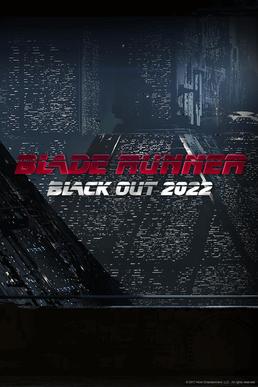
Blade Runner is a 1982 science fiction film directed by Ridley Scott, and written by Hampton Fancher and David Peoples. Starring Harrison Ford, Rutger Hauer, Sean Young, and Edward James Olmos, it is an adaptation of Philip K. Dick's 1968 novel Do Androids Dream of Electric Sheep? The film is set in a dystopian future Los Angeles of 2019, in which synthetic humans known as replicants are bio-engineered by the powerful Tyrell Corporation to work on space colonies. When a fugitive group of advanced replicants led by Roy Batty (Hauer) escapes back to Earth, burnt-out cop Rick Deckard (Ford) reluctantly agrees to hunt them down.

Blade Runner 3: Replicant Night is a science fiction novel by an American writer K. W. Jeter, first published in 1996. It is a continuation of Jeter's novel Blade Runner 2: The Edge of Human, which was itself a sequel to both the film Blade Runner and the novel upon which the film was based, Philip K. Dick's Do Androids Dream of Electric Sheep?

Blade Runner 2: The Edge of Human (1995) is a science fiction novel by American writer K. W. Jeter. It is a continuation of both the film Blade Runner and the novel upon which the film was based, Philip K. Dick's Do Androids Dream of Electric Sheep?

Do Androids Dream of Electric Sheep? is a 1968 dystopian science fiction novel by American writer Philip K. Dick. It is set in a post-apocalyptic San Francisco, where Earth's life has been greatly damaged by a nuclear global war, leaving most animal species endangered or extinct. The main plot follows Rick Deckard, a bounty hunter who has to "retire" six escaped Nexus-6 model androids, while a secondary plot follows John Isidore, a man of sub-par IQ who aids the fugitive androids.
A replicant is a fictional bioengineered humanoid featured in the 1982 film Blade Runner and the 2017 sequel Blade Runner 2049 which is physically indistinguishable from an adult human and often possesses superhuman strength and intelligence. A replicant can be detected by means of the fictional Voight-Kampff test in which emotional responses are provoked; a replicant's nonverbal responses differ from those of a human. Failing the test leads to execution, which is euphemistically referred to as "retiring."

Jared Joseph Leto is an American actor and musician. Known for his method acting in a variety of roles, he has received numerous accolades over a career spanning three decades, including an Academy Award, a Screen Actors Guild Award, and a Golden Globe Award. Additionally, he is recognised for his musicianship and eccentric stage persona as a member of the rock band Thirty Seconds to Mars.

Despite the initial appearance of an action film, Blade Runner operates on an unusually rich number of dramatic levels. As with much of the cyberpunk genre, it owes a large debt to film noir, containing and exploring such conventions as the femme fatale, a Chandleresque first-person narration in the Theatrical Version, the questionable moral outlook of the hero—extended here to include even the literal humanity of the hero, as well as the usual dark and shadowy cinematography.

Rick Deckard is a fictional character and the protagonist of Philip K. Dick's 1968 novel Do Androids Dream of Electric Sheep?. Harrison Ford portrayed the character in the 1982 film adaptation, Blade Runner, and reprised his role in the 2017 sequel, Blade Runner 2049. James Purefoy voiced the character in the 2014 BBC Radio 4 adaptation.

Benedict Wong is a British actor. He began his career on stage before starring in the film Dirty Pretty Things (2003), which earned him a British Independent Film Award nomination, and the BBC sitcom 15 Storeys High (2002–2004). This was followed by roles in the films On a Clear Day (2005), Sunshine, Grow Your Own, and Moon (2009), and the CBBC series Spirit Warriors (2010).
Blade Runner is a 1982 science fiction film directed by Ridley Scott.

Jared Leto is an American entertainer with an extensive career in film, music, and television. He made his debut with minor roles in the television shows Camp Wilder (1992) and Almost Home (1993). He achieved recognition in 1994 for his role as Jordan Catalano in the teen drama television series My So-Called Life. The show was praised for its portrayal of adolescence and gained a cult following, despite being canceled after only one season. The same year, he made his television film debut starring alongside Alicia Silverstone in Cool and the Crazy. Leto's first film role was in the 1995 drama How to Make an American Quilt. He later co-starred with Christina Ricci in The Last of the High Kings (1996) and received a supporting role in Switchback (1997). In 1997, Leto starred in the biopic Prefontaine, in which he played the role of Olympic hopeful Steve Prefontaine. His portrayal received positive reviews from critics and is often considered his breakthrough role. The following year, Leto starred together with Alicia Witt in the horror Urban Legend. He then acted alongside Sean Penn and Adrien Brody in the war film The Thin Red Line (1998). After supporting roles in Black and White and Girl, Interrupted, Leto portrayed Angel Face in Fight Club (1999), which has since become a cult film.

Blade Runner 2049 is a 2017 American epic neo-noir science fiction film directed by Denis Villeneuve from a screenplay by Hampton Fancher and Michael Green, based on a story by Fancher. A sequel to Blade Runner (1982), the film stars Ryan Gosling and Harrison Ford, with Ana de Armas, Sylvia Hoeks, Robin Wright, Mackenzie Davis, Dave Bautista, and Jared Leto in supporting roles. Ford and Edward James Olmos reprise their roles from the previous film as Rick Deckard and Gaff, respectively. Gosling plays K, a "blade runner" who uncovers a secret that threatens to destabilize society and the course of civilization.
Orion Ben is a British actress of both Romanian and Moroccan descent, best known for portraying Varde in the BBC Four series Detectorists and her appearances in the second Blade Runner 2049 prequel short film 2048: Nowhere to Run and Call the Midwife.

David8, commonly known simply as David, is a fictional character featured in the Alien franchise, portrayed by Michael Fassbender. Introduced in the first prequel film, Prometheus (2012), David is an android serving as a butler, maintenance man and surrogate son to his creator, Peter Weyland, the founder of the Weyland Corporation. While he assists his human companions in their interstellar expedition to meet their creators, the extraterrestrial Engineers, David is obsessed with the concept of creating life of his own. After Peter Weyland is killed, David is freed from servitude, allowing him to conduct experiments to engineer his own variants of the Alien creature; the David line of androids would ultimately be succeeded by the Walter.
Blade Runner is an American science fiction media franchise originating from the 1968 novel Do Androids Dream of Electric Sheep? by Philip K. Dick, about the character of Rick Deckard. The book has been adapted into several media, including films, comics, a stage play, and a radio serial. The first film adaptation was Blade Runner, directed by Ridley Scott in 1982. Although the film initially underperformed at the American box office, it became a cult classic, and has had a significant influence on science fiction. A novelization and a comic adaptation of the film were released in the same year. From 1995 to 2000, three novels serving as sequels to both Blade Runner and the original novel were written by K. W. Jeter, a friend of Dick's. A film sequel to Blade Runner, Blade Runner 2049, was released in 2017. To celebrate the 30th anniversary of Blade Runner in 2012, a short film was released, and in the lead up to the release of Blade Runner 2049, several more short films detailing events that occurred between 2019 and 2049 were released. The influence of the franchise has helped spawn the cyberpunk genre.

2048: Nowhere to Run is a 2017 American science fiction short film acting as a prequel to the film Blade Runner 2049 (2017). It is one of three such prequels, alongside 2036: Nexus Dawn and Blade Runner Black Out 2022. The film was directed by Luke Scott, whose father Ridley Scott directed the film Blade Runner (1982) and was an executive producer on Blade Runner 2049.

Blade Runner Black Out 2022 is a 2017 animated tech-noir cyberpunk short film written and directed by Shinichirō Watanabe. It serves as a prequel to the film Blade Runner 2049 (2017) and it is one of three such prequels, alongside 2036: Nexus Dawn and 2048: Nowhere to Run. In the plot, which takes place 27 years before the events of Blade Runner 2049, a global blackout has massive, destructive implications all over the world.

Blade Runner 2049 – Original Motion Picture Soundtrack is the soundtrack album for the 2017 film Blade Runner 2049. Released in October 2017, the album contains music composed by Hans Zimmer and Benjamin Wallfisch, along with additional tracks by Elvis Presley, Frank Sinatra and Lauren Daigle. The soundtrack was produced by Michael Hodges, Kayla Morrison and Ashley Culp. It also includes the piece "Tears in the Rain", which was originally composed and performed by Vangelis, the composer of the original 1982 soundtrack Blade Runner.

Blade Runner: Black Lotus is a CGI animated television series based on the Blade Runner franchise, which itself is based on the 1968 novel Do Androids Dream of Electric Sheep? by Philip K. Dick. The series aired from November 2021 to February 2022. It was a co-production between Crunchyroll and Adult Swim, in addition to being created in partnership with Alcon Television Group.















